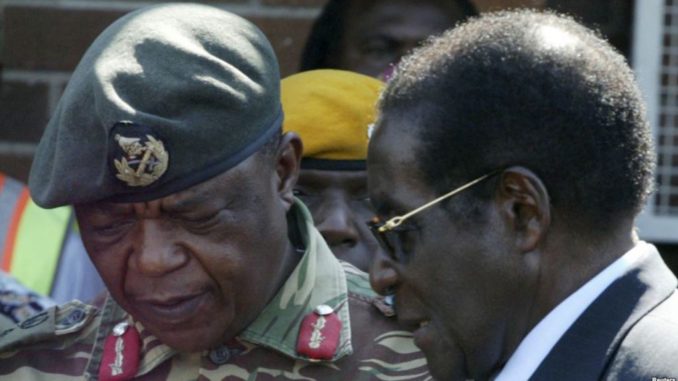
THE streets of Harare exploded in jubilations and celebrations on Tuesday following the announcement of the resignation of Robert Gabriel Mugabe, who had ruled Zimbabwe for almost four decades. He is the only president that the country’s population has known for over 37 years of independence. He was the world’s oldest president at 93.
For a week, he had clung to power after the country’s military Generals moved against him following his sack of Emmerson Mnangagwa, his erstwhile deputy. The decision to sack Mnangagwa marked a break with his major support base, the war veterans and the military leaders who participated in the liberation war. The drama lasted for a week, culminating in his resignation that marks a major turning point in the history of Zimbabwe. It has echoed across the continent where a number of rulers, gripped by the lure of power in perpetuity, now confront the possibility of their edifice crumbling in like manner. It will be recalled that in a speech before the African Union in 2016, Mugabe had vowed to remain at the helm “until God says: Come.”
Mugabe was born on 21 February, 1924 as the son of an absentee father in the rural area around Kutama. He attended the Kutama College and the University of Fort Hare, an institution in South Africa that became an incubator for some of the continent’s most fabled nationalist leaders, including Nelson Mandela. He worked as a school teacher in Ghana between 1956 and 1960, when he returned to Rhodesia (Zimbabwe’s former name). In 1965, as part of the wave of independence that swept through Africa, Ian Douglas Smith declared independence from Britain with a white minority rule in Rhodesia. Mugabe and many others would not stomach independence under white rule. In 1963, he helped the Reverend Ndabaningi Sithole to form the Zimbabwe African National Union (ZANU) as a breakaway from Joshua Nkomo’s Zimbabwe African People’s Union (ZAPU). He was convicted of sedition and imprisoned in 1964. While still in prison, he led a group to depose Sithole as ZANU’s leader in 1974. His only child died in Ghana while he was in detention. The white authorities did not allow him to attend the funeral. On release from prison, he fled to Mozambique.
From Mozambique, Mugabe led ZANU in a protracted struggle against white minority rule. He was joint leader, with Joshua Nkomo, of the Patriotic Front (PF) of Zimbabwe during the Civil War of 1975-1979. He participated in the Lancaster House negotiations that led to the agreement that resulted in the dismantling of white minority rule. He led ZANU-PF to victory in the 1980 general election and became the first Prime Minister of Zimbabwe, as the country was renamed. Initially, the country prospered under him. He expanded education and spending on healthcare, increased wages and improved social services and food subsidies. These led to massive improvements in the lives of the average Zimbabwean. During that period, Zimbabwe recorded one of the highest literacy levels in Africa. Mugabe created the international image of an anti-colonialist and many Africans revered him as a hero of the fight for Independence. However, the series of changes he made in the party organisation and government to consolidate his authority saw him increasingly resort to suppression of dissent and perceived threats to his dominance. He used violence, guile and corruption to outflank his rivals.
On December 31, 1987, Mugabe became Zimbabwe’s first executive president after effectively establishing one-party rule. The 1990 and subsequent multiparty elections were marked by intimidation and violence. Naturally, opposition to his rule intensified. In 2002, he made a law to pursue a programme of confiscating white-owned farms which were largely claimed by politically connected individuals with little or no farming experience. But the decline in agricultural productivity, drought and sanctions by a number of Western countries led to severe food shortages and Mugabe’s popularity continued to decline. Western leaders accused him of corruption, suppression of political opposition, mishandling of land reform and human rights abuses. A bungled 2008 elections ended up in a power-sharing pact between him and his main opponent, Morgan Tsvangirai. Since then, the country has been embroiled in political crisis.
Mugabe’s fall was effected from the internal struggle for succession within the ZANU-PF, with his former secretary turned wife at the heart of the contest. Notorious for her lavish lifestyle, sharp tongue and ambitious politics, Mrs Grace Mugabe had succeeded in removing Joice Mujuru, who was thought to be a main contender to succeed Mugabe, from the way. Her attempt to do the same to Mnangagwa exploded in a military reaction. Once dismissed as vice-president, Mnangagwa slipped out of the country and mobilised the top military commanders to take action against the Mugabe family. The ZANU-PF removed Mugabe as party leader and joined the military to pressurise him to resign. Mnangagwa will be sworn in as president on Friday.
The fall of Mugabe is a lesson for the political leadership in Africa. In 37 years, he moved Zimbabwe from being a breadbasket to a basket case, from an emerging land of hope and prosperity to a land of want and poverty. He undermined the rule of law and practised impunity to the point that he thought he could foist his wife on the people. While we are happy that the military did not assume the direct control of the country, we believe that the major role it has played in the unfolding process was dictated by its role in sustaining Mugabe’s repressive regime. Mugabe’s ouster presents an opportunity for the military to support democracy. We hope that Mnangagwa will not toe Mugabe’s path. He must learn from Mugabe’s mistakes and create an environment for the economy and human development to flourish. This is indeed a new opening for Zimbabweans. We hope they will be able to chart a path of progressive and inclusive development for their country.
END

Be the first to comment